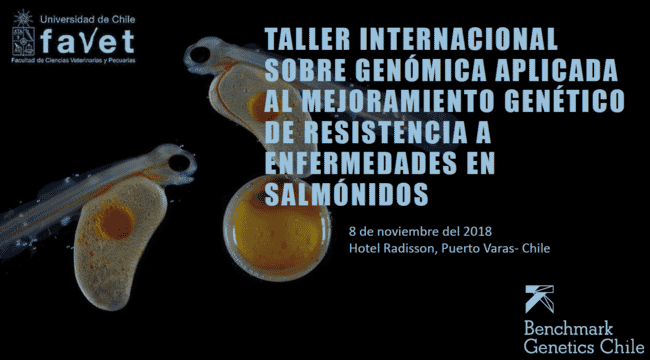Sea Lice 2018 took place in Punta Arenas on 4-8 November, while at a break-out seminar in Puerto Varas on 8 November, scientists from Universidad de Chile and The Roslin Institute presented research funded by Chile and UK into the genetics of sea lice resistance and SRS.

Salmon breeding company, Benchmark Genetics Chile SA have reported that they are already using genetic markers to predict which fish will be resistant to species of sea lice in Chile and Europe. Examining the expression patterns of genes in resistant and susceptible fish during a sea lice challenge, the scientists from Chile and UK are discovering the location and purpose of genes that make fish resistant or susceptible to sea lice. A similar process is being taken to investigate the genetic basis of resistance to SRS.
As part of the University of Chile and The Roslin Institute collaboration, two projects have been carried out focused on uncovering the functional genomic basis of resistance against sea lice and SRS in Chilean salmon aquaculture to accelerate genetic progress in these traits. This research has been shortlisted for the Newton Prize, which serves to highlight science and innovation promoting economic and social development of Newton partner countries.
Professor Ross Houston of The Roslin Institute described the findings: “In this collaborative project, we used the latest genomics technologies to identify specific genes that underlie genetic resistance to sea lice and SRS, and to improve cost-effective methods for genomic selection. Genes controlling immune function, iron availability, cell division and pathogen recognition showed differential expression between resistant and susceptible fish.”
Professor Jose Manuel Yanez, of Universidad de Chile, said: "The collaboration between Universidad de Chile, The Roslin Institute and Benchmark Genetics Chile has helped to identify the genetic basis of the resistance to two of the most important diseases affecting Chilean salmon aquaculture and we believe that the findings from this work will help enhance the genetic improvement aimed at generating more robust fish for production."
Alan Tinch, technical services director at Benchmark Genetics, added: "Collaboration is vitally important in the development of practical solutions to sea lice and other pathogens and is an integral part of our global approach to tackle the major challenges in aquaculture. Finding out which genes control sea lice and SRS resistance will ensure that we continue to run effective breeding programmes to produce hardy salmon for our customers."




